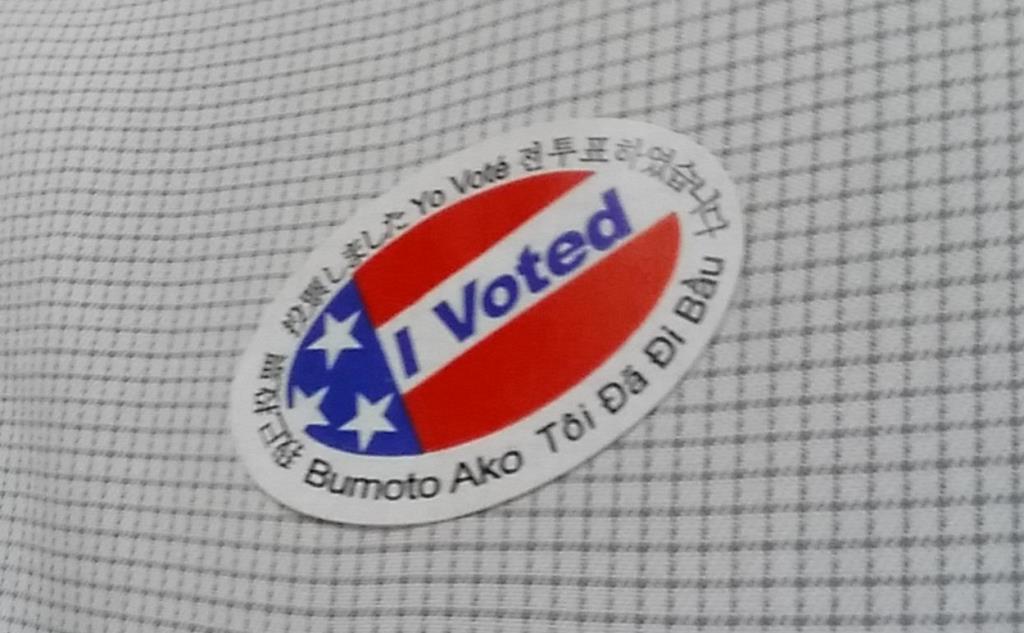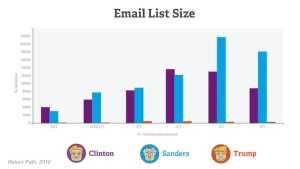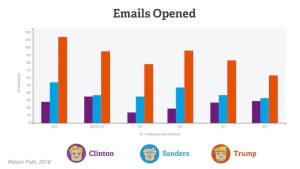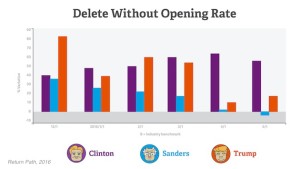In honor of Primary Day here is California, let’s get POLITICAL.
(I voted today. Not gonna get up on a soapbox just for Primary Day, but you see where I’m going with this… P.S. #GoHilary2106!)
You don’t have to be especially email marketing savvy to know a well-tended email list is a lucrative asset.
And that’s not just a bunch of hot air. Both solo-preneurs (think one man, or one gal, internet marketing operations taking down six and seven figure annual incomes) and big businesses (think Amazon) have made BIG $$$ off of active and engaged email lists.
But the real question here is, what constitutes “active” and “engaged?”
For a different view on this subject, let’s turn to a recent study by Return Path (an email marketing consultancy). RP compared promotional email subscriber list size, along with open + click-through rates for the top three candidates in the current Presidential primary race.
And their study uncovered some interesting results…
List size
This first graphic shows each candidate’s respective list size.
Clearly Donald “The Donald” Trump is lagging FAR behind here. Never having held political office or mounted a legit political campaign (let’s just agree to call his 2012 step into the fray a “publicity stunt”), Trump doesn’t have the same activist machinery behind him. And activism in the modern era relies primarily on email driven outreach.
Emails Opened
The second graphic shows the number of emails opened by each candidate’s subscribers.
Obviously the tables have turn. Trump’s subscribers are more than twice as likely to open his emails in comparison to Sanders, and two thirds more likely in comparison to Clinton.
I’m no statistician, but this seems to imply that while Trumps list is smaller, his subscribers are FAR more engaged.
Emails Deleted Without Opening
The final graphic shows the number of emails deleted before opening by each candidate’s subscriber.
Clearly Sanders is winning this category. His subscribers are FAR less likely to simply dispatch his email with a quick stroke of the delete key. Trump and Clinton started out neck-and neck here. But Clinton’s subscribers have been more delete prone over the last several months.
Conclusions & Takeaways for Your Business
Here are some thoughts about the candidates’ email marketing successes and failures, and advice on how you can apply lessons from their experiences to your email marketing…
1. Email Subscriber List Engagement Trumps (pun intended) List Size
While Trump has been quoted bragging about size of his member, his email subscriber list size is less than impressive. But per my supposition in the title of this post, it’s not the size of your list that determines open rates. It’s how engaged your subscribers are.
Takeaway – Of course you should ALWAYS be striving to grow your email list.
But keep in mind, size doesn’t imply quality. And the more subscribers on your list that consistently delete your emails without opening, the lower you domain’s Quality Score (and the lower your score, the more likely your emails are to end up in the spam folder of doom, never to be heard from again).
To combat this, email marketing experts recommend regularly purging your list. Send two or three emails to lax subscribers, noting they have failed to open your emails on a consistent basis over an extended period of time. Offer them the opportunity to re-subscribe. If they don’t respond after a couple of emails, remove them from your active subscriber list.
2. Novelty Effect
Something “new” stands out simply for the sake of, well, being “new.” New, however, isn’t necessarily original or unique or even interesting, beyond its newness. But new is novel, and for better or worse, novelty grabs attention.
In Trump’s case, he’s new to the political arena. He dipped a toe in the 2012 Presidential campaign, but this is his first bona fide bid for any political office.
For many of his subscribers, he’s largely an unknown quantity. And they’re curious, in part, about the novelty of his campaign (which frequently descends into a carnival sideshow atmosphere).
Clinton and Sanders, on the other hand, are seasoned political vets. The bulk of their subscribers have been on the respective candidate’s email list for many moons. And while
Clinton and Sanders subscribers may support them, they’re not as interested in reading more rhetoric, or being hit up for yet ANOTHER donation.
Takeaway – When you first gain a new prospect or client’s email contact, strike early and strike often.
The best is approach is an email series. If you use an Email Service Provider (ESP), like MailChimp, Aweber or Constant Contact, you can create a series of email Autoresponders.
Autoresponders are a sequence of pre-drafted emails that are doled out of a period of days, weeks or even months (and sometimes even years). Sequences usually begin with a welcome email that offers some form of valuable content for free as reward for “opting in,” AKA joining the email list.
Then over time, additional emails offer a mix of free valuable content and sales pitches. The free content is relevant to your subscribers (like this blog is to you ;-), and helps build trust and foster likeability. Meanwhile, the sales pitches position your services as a helping hand capable of solving your subscriber’s problems and fulfilling their needs.
3. Subscriber Fatigue
What’s one thing nobody wants? MORE EMAIL. Inboxes far and wide are jammed with spam emails not worth the digital ether they occupy. Yet, day after day, more and more worthless emails just keeping flooding your inbox.
One more unwarranted and unwanted and email…and you just might go e-postal!!!
Trump supporters haven’t been inundated with of years and years of campaign promotional emails. Thus his supporters haven’t quite burned out yet, and his open rates remain strong.
Apparently a large portion of Sanders’ supporters are Millennials, new to politics in general. So to them, this is all VERY novel. And that’s likely why his supporters are less apt to “delete first, and ask questions later.”
Takeaway – To avoid fatiguing your prospects and clients, make GALL DARN SURE your emails are relevant and contain value.
This doesn’t mean you cannot or should not send sales and promotional emails. To your ideal clients, what you’re “selling” has value, right? Of course!
Just be wary of too many “hard-sell” pitches. And avoid inundating prospects at the wrong time. If a prospects says “not now, but maybe in the future,” allow some time to pass, so the present can catch up with the “future.”
What Does Your Email Marketing Look Like?
Do you have an email list? If not, why? And if you do, how has it benefited your business? Stop by my Google+ page and share your experiences!






